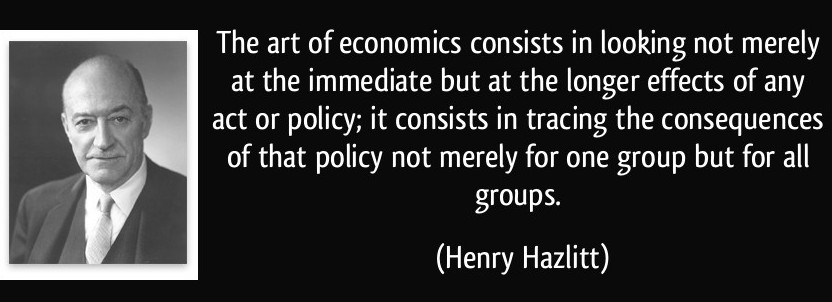|
home | what's new | other sites | contact | about |
||
|
Word Gems exploring self-realization, sacred personhood, and full humanity
Henry Hazlitt Economics In One Lesson The Lesson
"Economics is haunted by more fallacies than any other study known to man. This is no accident.
"While every group has certain economic interests identical with those of all groups, every group has also, as we shall see, interests antagonistic to those of all other groups.
"The group that would benefit by such policies ... will argue for them plausibly and persistently. It will hire the best buyable minds to devote their whole time to presenting its case. "And it will finally either convince the general public that its case is sound, or so befuddle it that clear thinking on the subject becomes next to impossible. "In addition to these endless pleadings of self-interest, there is a second main factor that spawns new economic fallacies every day.
"The bad economist sees only what immediately strikes the eye; the good economist also looks beyond. The bad economist sees only the direct consequences of a proposed course; the good economist looks also at the longer and indirect consequences. The bad economist ... on one particular group; the good economist ... on all groups...
"Doesn't every little boy know that if he eats enough candy he will get sick? ... do not the idler and spendthrift know, even in the midst of their glorious fling, that they are heading for a future of debt and poverty? "Yet when we enter the field of public economics, these elementary truths are ignored. There are men today regarded as brilliant economists, who deprecate savings and recommend squandering on a national scale...
"The long-run consequences may ... not become evident for decades. But in every case those long-run consequences are contained in the policy as surely as the hen was in the egg... "From this aspect, therefore, the whole of economics can be reduced to a single lesson ... to a single sentence:
"Nine-tenths of the economic fallacies that are working such dreadful harm in the world today are the result of ignoring this lesson... "It is true ... we ought not to concentrate only on the long-run results... [This creates] a certain callousness toward the fate of groups that were immediately hurt by policies ... which proved to be beneficial on net balance and in the long run. "But comparatively few ... make this error... The most frequent fallacy by far ... is to concentrate on the short-run effects... "It is often complained that demagogues can be more plausible in putting forth economic nonsense from the platform than the honest men who try to show what is wrong with it... The reason is that demagogues and bad economists are presenting half-truths. They are speaking only of the immediate effect... The answer consists in ... correcting the half-truth with the other half... [by considering] all chief effects of a proposed course... |
||
|
|

